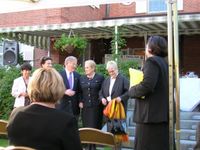The Women of Summer 1980 - 25 Years On
The Women of Summer 1980 - 25 Years On
When asked what he wanted to be when he grew up, Barbara Labuda’s young son said that he wanted to be a political prisoner. That was at the height of the Solidarity movement in Poland, today he is a “good human being,” according to his mom (the current Polish Secretary of State). But his answer was perfectly fit for those times, from a child’s perspective, his parents were both active underground participants ('dissidents') during Poland’s resistance to Communist rule in the eighties, and both found themselves in jail, often alternating their incarceration.
On August 29th, the USA Ambassador to Poland, Victor Ashe, hosted a special, first of its kind, conference at his residence in Warsaw. According to the conference participants, this was the first official recognition of the role of women in sustaining Solidarity through martial law. Among the attending and conspicuous dignitaries was former USA Secretary, Madeleine Albright (although she didn’t ‘steal the spotlight’ or make any remarks during the conference). A few Ambassadors of other countries were also recognized, among them Lithuania and Costa Rica. Also present were quite a few key players during Solidarity, they were in the audience and acknowledged by the main conference participants.

Shana Penn, Ambassador Ashe,
Madeleine Albright, Barbara Labuda
The three main participants were author Shana Penn, whose recent work “Solidarity's Secret: The Women Who Defeated Communism in Poland” was about the activities of the female editors of the Solidarity underground weekly Tygodnik Mazowsze. One of those editors, and participants was Helena Łuczywo [Wikipedia link problem], currently Deputy Editor-in-Chief of Gazeta Wyborcza newspaper (which she helped found in 1989). Before martial law, Łuczywo had managed the Solidarity Press Agency, and before its inception, she was acting editor of Robotnik, a workers' publication she founded. And finally, mentioned earlier, Barbara Labuda currently serves as the Secretary of State in the Chancellery of the President of Poland, a position she has held since 1998. She was elected to the Sejm in 1989 after decades of political work. During martial law, Ms. Labuda was one of the leaders of the underground opposition in Wrocław. She was active in Solidarity from its earliest days, previously working with the Committee for the Defense of Workers.

Helena Łuczywo, Shana Penn, Ambassador Ashe,
Madeleine Albright, Barbara Labuda
Sandwiches in the Shipyard and The Teller Revolution
According to Labuda, the dominant images of women during Solidarity were connected with activities like “weeping, praying, cleaning floors…making sandwiches.” But this was only a part. Labuda claimed that of the estimated 10 million strong members of Solidarity, half were women – however, and this would have influenced the media’s lens, only 8% of Solidarity leadership was women. During Martial Law (1981-1983) women understood their role as ‘patient revolutionaries.’ An underground paper was published (Tygodnik Mazowsze - up to 80,000 illegal copies each issue) by women to keep the voice of the movement strong serving to take away the government’s monopoly on information. Women maintained a Polish version of the underground railroad with networks of safe houses to hide Solidarity men. Interestingly, cultural blinders in the form of sexism was one of Solidarity’s biggest allies (and Achille’s Heel) since the Secret Police sought dissident men. Labuda stressed that women were overlooked, “the government’s sexism became our secret weapon.” Labuda presented Solidarity women as a backbone of the movement with the long view in mind, this was not the time for dramatic revolution. She referred to it as a “Teller Revolution” in which crucial information was shared in daily chatter and usually without much attention paid by the public, or official bosses within earshot.

An enthusiastic audience
The Fight for Democracy, Treason, and the Decline of the Left
Helena Łuczywo presented the issue more broadly, looking from a global perspective and how women fight for Democracy everywhere. Using Poland and her role during Martial Law as an example, she said that thousands of women were involved, mostly participating behind the scenes, but not always. She mentioned the radio station launched by women in Poznan. Łuczywo made sure to mention that both women and men were necessary for the success of the movement and that the recognition of the role of women in Solidarity is not intended to displace or compete with men – simply to recognize and add historical equity. She also made some critical comments about the ironies of the success of Solidarity – reflecting that the “people who actually sustained and started the movement have become its biggest victims.” We mustn’t forget Łuczywo said, that Solidarity was a working class movement (referring to Robotnik).Will the neo-communists in Poland, ironically, attract these disenfranchised people? She spoke of a treason and that the Left is dying, not only in Poland – there is too little solidarity. “Is this tradition over?” she asked.
Solidarity Today: What’s the Significance?
There were two streams, or threads active in the questions that ensued. One line of thinking looked at the implications of Solidarity for women today. When asked by an audience member, “Where are all the women in public life?” Barbara Labuda said that she frankly didn’t know and was perplexed by the dearth of women in public life. The other line of thought focused more on the quotidian factors brought on during Martial Law, women were responding to real issues of daily importance – the problems were brought right into their homes and they had to respond. The issue wasn’t painted with such broad historic overtones – they weren’t only fighting for democracy buy simply trying to keep their loved ones from being arrested, or getting the next print edition of Tygodnik Mazowsze distributed. Labuda said that having a child during this time was very difficult, and presaged the modern day dilemma of choosing between family or career faced by many women in Poland today. Shana Penn noted that the question regarding the absence of women in public life should not only, if ever, be addressed to women, but rather to men. Now, as during Solidarity, women are not in the public spotlight. However, for at least ninety minutes, on the 25th anniversary of Solidarity, it was women giving a public voice to a movement that defeated communism -- it appeared that history, and how it is perceived, doesn’t have to repeat itself.
******************************************************
PolBlog - News Poland 24/7
Poland's first (almost) daily English-language news blog.
Read the news then share your views
















0 Comments:
Prześlij komentarz
<< Home